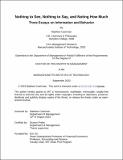| dc.contributor.advisor | Prelec, Drazen | |
| dc.contributor.author | Cashman, Matthew | |
| dc.date.accessioned | 2023-11-02T20:06:38Z | |
| dc.date.available | 2023-11-02T20:06:38Z | |
| dc.date.issued | 2023-09 | |
| dc.date.submitted | 2023-08-25T19:53:44.309Z | |
| dc.identifier.uri | https://hdl.handle.net/1721.1/152661 | |
| dc.description.abstract | I present three essays that examine information flows and behavior. The first examines the effect of sequential play in Public Goods Games in cases where players move one after another but do not see each others’ moves. Even with no information flow—when there is nothing to see of others’ decisions—order of play affects contributions to the public good. The second essay considers pre-play socializing and its effects on coordination games and hold-up games. Pre-play small-talk results in better outcomes even when players talk before they know they will be playing a game—before they have anything of strategic relevance to say. The third essay presents a novel quantitative, empirical means of measuring the flow of memes through minds. Most ways of learning what other people know rely on strong commitments to what the right question to ask is. Using cloze completion tasks I outline a principled, content-agnostic method of estimating how much information from a given text is stored in a reader’s mind. | |
| dc.publisher | Massachusetts Institute of Technology | |
| dc.rights | Attribution-NonCommercial 4.0 International (CC BY-NC 4.0) | |
| dc.rights | Copyright retained by author(s) | |
| dc.rights.uri | https://creativecommons.org/licenses/by-nc/4.0/ | |
| dc.title | Nothing to See, Nothing to Say, and Noting How Much
Three Essays on Information and Behavior | |
| dc.type | Thesis | |
| dc.description.degree | Ph.D. | |
| dc.contributor.department | Sloan School of Management | |
| dc.identifier.orcid | 0000-0002-1041-6128 | |
| mit.thesis.degree | Doctoral | |
| thesis.degree.name | Doctor of Philosophy | |
